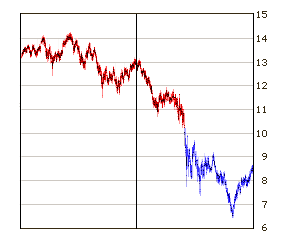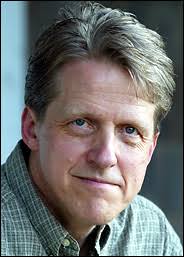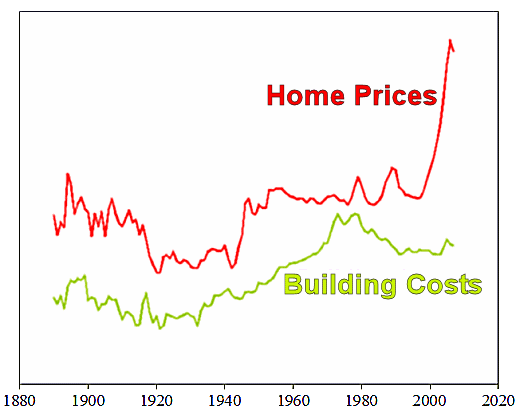
DOW JONES INDEX [last 2 years]
What will we call it, this thing that happened on Monday, September 15th, 2008? It seemed so abrupt to most of us regular Americans who were mostly thinking about the election coming in a month or so. We knew about the "housing bubble" and were just catching on to the fact that the price of gasoline might be the same thing, a bubble, but we were poorly prepared for the cataclysmic changes that started on that day. We would learn first that it was precipitated by the bankruptcy of Lehman Brothers, a financial giant that had been with us since before the Civil War – the largest bankruptcy in our country’s history. And it took us all a time to learn that it was the tip of an iceberg, that most of our financial Institutions were in the tank, largely due to something we mortals either had never heard of or had never realized the significance of – credit default swaps and mortgage backed securities. The financial world had insured the housing boom against collapse and floated bad mortgages as if they were money, so they were about to go down like a bunch of dominos. Within days, Bush was going to Congress asking for a Trillion dollars to shore up the Banks, and we regular folks were learning about all sorts of horrifying things that had gone on in the financial world. Maybe each of us knew a small piece of the story, but I doubt that many of us saw this hurricane on the radar screen until it came ashore. I sure didn’t. And it didn’t even have a name.
The analogy with Hurricanes isn’t half bad. We have governmental agencies that are specifically set up to watch Hurricanes. As we approach "Hurricane Season," they move into high gear to track the Hurricanes being generated off the African Coast that cascade across the Caribbean aiming into the Gulf of Mexico and our lower Atlantic Coast. And we give them names before they arrive. The big ones leave their mark [Hugo, Andrew] and some change the face of the country for a very long time [Camille, Katrina]. Hurricane scientists had been worried about New Orleans for some time. The had already named the Hurricane that would take the city out. It was called "the Big One."
 Science, at its best, starts with data, and theories should always follow that observational base. Young scientists break away from their colleagues when they find something in their field that doesn’t fit – an exception to the prevailing rules. Einstein noted that Newton’s Laws only fit the middle, and didn’t work when you looked at either huge astronomical objects or very tiny particles. It wasn’t his theories that mattered so much. It was his observations. And science shines when it can be used to predict what’s coming. Was there such a person in the field of Macroeconomics that could’ve let us know about that graph at the beginning of this post? Sure. His name was Robert Shiller. And he did let us know.
Science, at its best, starts with data, and theories should always follow that observational base. Young scientists break away from their colleagues when they find something in their field that doesn’t fit – an exception to the prevailing rules. Einstein noted that Newton’s Laws only fit the middle, and didn’t work when you looked at either huge astronomical objects or very tiny particles. It wasn’t his theories that mattered so much. It was his observations. And science shines when it can be used to predict what’s coming. Was there such a person in the field of Macroeconomics that could’ve let us know about that graph at the beginning of this post? Sure. His name was Robert Shiller. And he did let us know.
We think of Einstein as the ultimate "egghead," locked in his study at Princeton writing obscure equations on a blackboard, lost in a daze of autistic brilliance. In fact, he was an out and about guy with an eye for the ladies. He wrote a letter to the President warning him of a coming disaster, the development of a bomb that would change history, and in the end, we got there first. Shiller’s like that. He’s a Macroeconomist at Yale, but he’s out there in the financial world selling his science [the Case-Shiller Index] and starting companies. I guess he’s something of a scientist/entrepreneur. Speaking of "clear as a bell"…

Robert Shiller studies "financial bubbles" – situations where there’s a boom in some financial sector that transcends our usual supply/demand view of Capitalistic Markets. The one he picked to study in depth was the housing market. It was a good choice, and he helped develop a practical index [the Case shiller Index] that showed [in spades] that our housing market was becoming radically inflated. He predicted that it was headed for a fall long before it happened. He even apologized later for not screaming loud enough.
Are there structural changes we need to make so that we don’t have this sort of craziness again?Yes. This crisis was substantially caused by a failure to manage real estate risk. Notably, we got individual homeowners into a leveraged position typically with their entire life savings in real estate in one city, in one house. That’s very risky. I have one proposal for continuous workout mortgages. Right now we think it’s a great thing if banks will give struggling homeowners a workout. Why do we only want to come in after the fact? My vision for our future is that it should be planned for and priced into the initial mortgage. We could update mortgages in a way they protect people from things beyond their control— like high national unemployment.
What else?Home-equity insurance. We want to have homeowners’ insurance, which protects against things like fires, updated so that it protects against a loss of market value. Fires were a big problem hundreds of years ago. Houses were burning down all the time. Now we’ve developed a different problem—the residential housing market has gotten much more volatile.
The company you started, MacroMarkets, just got approval for tradable securities linked to the Case-Shiller house-price index. How does that factor in?One reason we have bubbles in the housing market is because there’s been no way to short housing [that is, to make money when prices fall]. The ability to short is essential to an efficient market, otherwise there’s nothing to stop zealots from pricing things abnormally high. If you buy one of these long securities, called UMM, it’s like buying a house, except you don’t have to go through the real estate agent, take possession of a property, maintain it, rent it out. But we also have the DMM, which is short housing. Markets like this will also create an infrastructure for products. For example, insurers could issue home-equity insurance and then hedge themselves by taking a position in this market.
the thing Shiller saw coming…
I’ll admit up front that I don’t fully grasp what he’s saying, but I’ll take a shot at it. In this crisis, one of the central things that happened was that risk could be passed on. In the past, the check on the housing market had been that the loaning institutions shouldered their own risks, which kept housing prices honest. When the loaning institutions were given a way to hedge their risks, or even worse, sell their risk, a toxic situation developed that passed the risk up a chain to people who insured that risk and made a huge short-term profit, oblivious [or indifferent] to the coming disaster.
Shiller’s solution is pretty creative. He’s suggesting that rather than bemoaning the failures of the system that allowed this to happen, we should rethink our whole approach to the housing industry and the problem of mortgages. He wants to move risk management down to the level of the consumer, the home owner, by building the "insurance" into the mortgage itself. That puts risk management in the hands of actuarial scientists rather than speculators on an unregulated derivative market or hot-shots in places like AIG.
Sorry, the comment form is closed at this time.